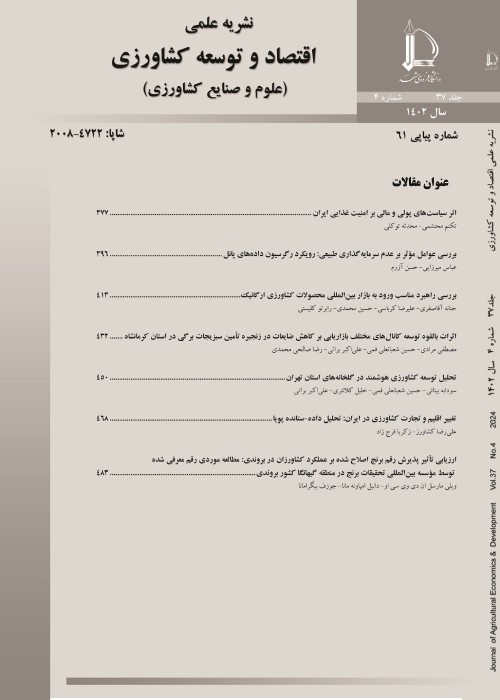Farmer's Satisfaction from Installing Intelligent Flowmeter on Underground Water Wells (The Case of Mahidasht County, Kermanshah Province)
Author(s):
Article Type:
Research/Original Article (دارای رتبه معتبر)
Abstract:
Introduction
Agriculture sector is the main consumer of water in Iran. According to statistics, global dependency of agriculture sector to underground water is 37.5% while in the Middle East the rate is 46.2% but in Iran, this amount exceeds 62%. This statistic indicates that underground water consumption by agriculture sector in Iran is much higher in comparison with other parts of the world bringing up more challenges to the country. As a result, the Iranian government has long tried to apply diverse strategies to conserve agricultural water by the sector. One of these strategies which has recently been executed by the government, is installing intelligent flowmeter on agricultural wells. Accordingly, farmers are forced to use this strategy to consume less water, thereby, managing underground water more efficiently. Notwithstanding the different extension programs applied by the government to encourage farmers to accept this new strategy more satisfactorily, farmers are not satisfied by the strategy causing them to resist against installation of flowmeter on their agricultural wells. Although compulsory, if government could encourage farmers to use this strategy more willingly, they will conduct a better behavior towards water conservation. Therefore, studying why farmers are not satisfied by this strategy of water management is of critical importance to policy makers and practitioners. To that end, the main purpose of this research was to investigate factors affecting farmers satisfaction from installing intelligent flowmeter on their agricultural well applying theory of Values, Beliefs, and Norms. The theory has been applied by many scholars to investigate environmental conservation behaviors but all of them have addressed voluntary behaviors. We wanted to know whether it could be applied to study compulsory behaviors as well.Materials And Methods
This cross-sectional survey research was conducted in Mahidasht county, Kermanshah province, Iran. According to the statistics, there are currently 352 intelligent flowmeters installed on the agricultural wells in the region irrigating more than 8000 hectares of agricultural lands. Using stratified random sampling technique, 120 farmers were chosen. Data were gathered during spring and summer of 2016 through a questionnaire validity of which was confirmed by faculty members and experts of agricultural extension and irrigation. The reliability of the questionnaire was confirmed applying Cronbachs alpha coefficient analysis. Data were analyzed applying AMOS software. We used path analysis technique to address research objectives.Results And Discussion
Main results indicated that farmers are satisfied with an average level from installing the intelligent flowmeter on their wells. Most farmers have not been trained by the government on how to use the intelligent flowmeter efficiently. Furthermore, farmers mentioned that they have not been supported by the government after installation of the flowmeter. Most respondents mentioned that it is not fair to force farmers to install flowmeter on their wells as they cannot afford it. Also, they believed that this strategy does not decrease water consumption by farmers and considered the strategy as an insufficient solution for water management. Path analysis applying AMOS software showed that attitude towards water conservation, water conservation value, attitude towards installation fairness, attitude towards installation usefulness, income, subjective behavioral control, access to resources, education, and extension training afterward the installation, have significant positive effect on farmers satisfaction. A surprising finding was the insignificant influence of personal and social norms on farmers satisfaction which was against the theory of Values, Beliefs, Norms. The main reason behind this finding was that the sample was almost homogenous in terms of their norms regarding water conservation behavior. Therefore, this research cannot address whether farmers norms is influencing their satisfaction of installing flowmeter on their wells.Conclusion
theory of Values, Beliefs, and Norms could be applied to address compulsory water management behaviors by farmers. In fact, government could persuade farmers to accept compulsory water management strategies more willingly if it can change farmers attitudes and beliefs concerning environmental crisis. According to the result, farmers attitude towards water conservation has the highest effect on satisfaction followed by contextual factors of income and education. The findings revealed that lack of extension training on how to manage water more efficiently in the region is obvious. The findings of this study reveal that if government and policymakers prefer that farmers install flowmeter on their wells voluntarily even though it is compulsory, then they should invest more on changing farmers attitudes and beliefs towards water and environmental crisis through developing more extensive training programs in this regard. The results indicated that extension programs could have significant direct and indirect effect on farmers satisfaction and behavior. Therefore, it is suggested that different extension programs to be developed to affect farmers attitudes and beliefs regarding water conservation as the result shows the importance of attitude on farmers behavior towards water management.Keywords:
Language:
Persian
Published:
Journal of Economics and Agricultural Development, Volume:32 Issue: 1, 2018
Pages:
43 to 55
magiran.com/p1838646
دانلود و مطالعه متن این مقاله با یکی از روشهای زیر امکان پذیر است:
اشتراک شخصی
با عضویت و پرداخت آنلاین حق اشتراک یکساله به مبلغ 1,390,000ريال میتوانید 70 عنوان مطلب دانلود کنید!
اشتراک سازمانی
به کتابخانه دانشگاه یا محل کار خود پیشنهاد کنید تا اشتراک سازمانی این پایگاه را برای دسترسی نامحدود همه کاربران به متن مطالب تهیه نمایند!
توجه!
- حق عضویت دریافتی صرف حمایت از نشریات عضو و نگهداری، تکمیل و توسعه مگیران میشود.
- پرداخت حق اشتراک و دانلود مقالات اجازه بازنشر آن در سایر رسانههای چاپی و دیجیتال را به کاربر نمیدهد.
In order to view content subscription is required
Personal subscription
Subscribe magiran.com for 70 € euros via PayPal and download 70 articles during a year.
Organization subscription
Please contact us to subscribe your university or library for unlimited access!


